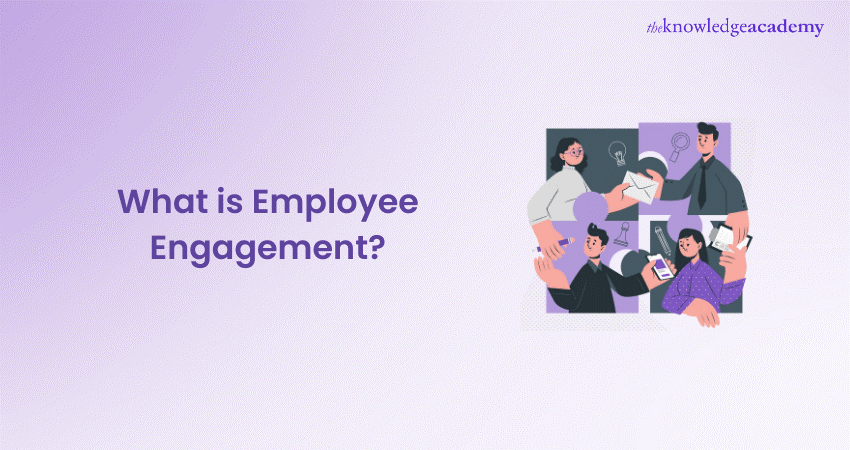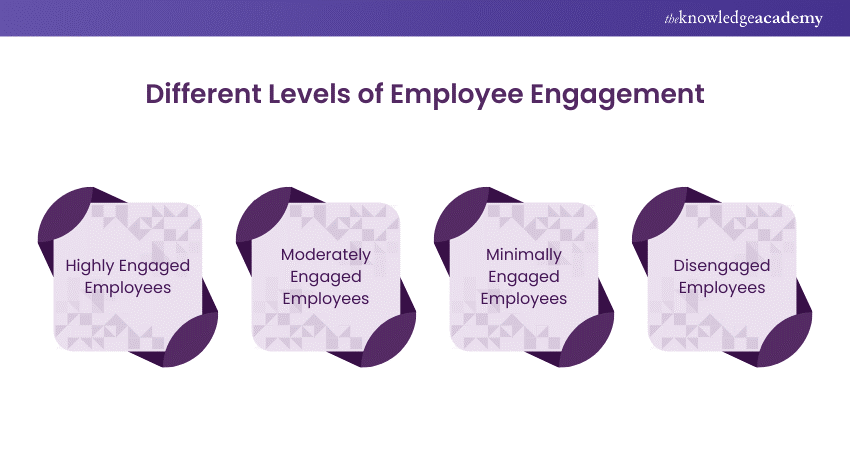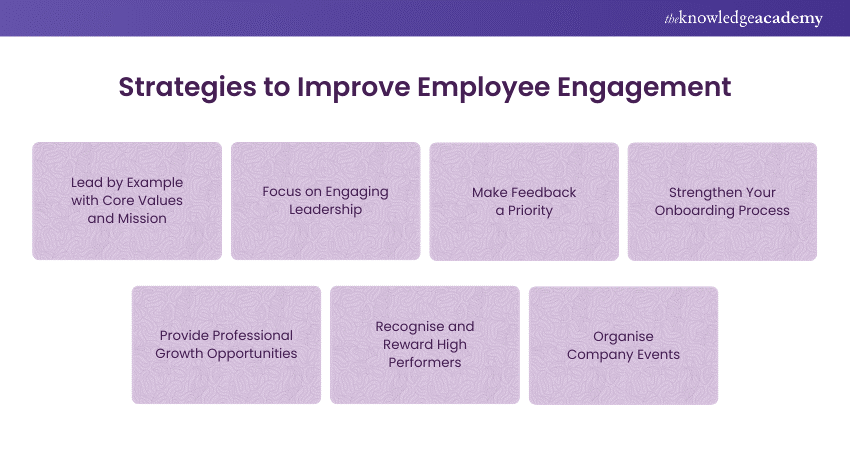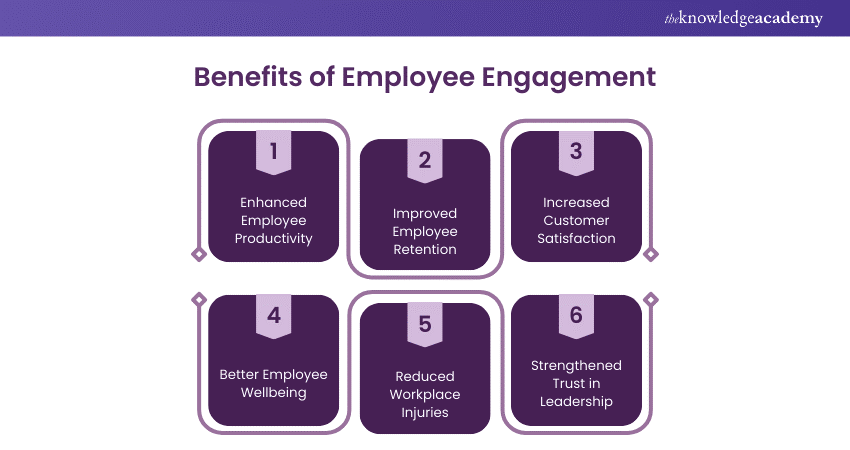We may not have the course you’re looking for. If you enquire or give us a call on +40 316317743 and speak to our training experts, we may still be able to help with your training requirements.
Training Outcomes Within Your Budget!
We ensure quality, budget-alignment, and timely delivery by our expert instructors.

Imagine a workplace where every team member not only meets expectations but surpasses them with genuine passion and purpose. That’s the magic of Employee Engagement – it’s not just about being present; it’s about being present with enthusiasm.
In this blog, we’ll dive into the essence of Employee Engagement, its significance, and strategies to enhance it within your organisation. We’ll also uncover methods to turn disengaged employees into highly motivated contributors. Ready to discover how Employee Engagement can revolutionise your organisation? Let’s dive in!
Table of Contents
1) What is Employee Engagement?
2) Different Levels of Employee Engagement
3) How to Improve Employee Engagement?
4) Benefits of Employee Engagement
5) Examples of Effective Employee Engagement
6) Conclusion
What is Employee Engagement?
Employee Engagement is an employee's emotional commitment to their organisation and its objectives. Employees who are engaged feel genuinely about their work and their company, going beyond simply earning a salary. They contribute to the organisation's success through dedication, increased productivity, improved customer service, and a great work environment.
Engaged employees are more likely to stay with the organisation, reducing turnover rates and cultivating a culture of loyalty and trust. In basic terms, Employee Engagement is a key driver of company success and satisfaction with work. Companies that prioritise Employee Engagement can develop a more engaged, productive, and loyal workforce.
Different Levels of Employee Engagement
There are various degrees of Employee Engagement within any workforce. Understanding these levels helps organisations develop strategies to increase engagement across the board.

1) Highly Engaged Employees
a) Enthusiastic about their work
b) Consistently go above and beyond
c) Demonstrate loyalty to the company
d) Proactively contribute to organisational goals
e) Take initiative in solving problems
f) Positively influence the team with their motivation
2) Moderately Engaged Employees
a) Perform tasks well with a positive attitude
b) Lack of the extra drive of highly engaged employees
c) Committed to their jobs but may not take the initiative
d) Benefit from encouragement to engage further with company goals
3) Minimally Engaged Employees
a) Complete tasks but lack a deeper connection with their roles
b) May not contribute beyond the job description
c) Can feel disconnected from the organisation’s purpose
d) Often due to unclear expectations or limited growth opportunities
4) Disengaged Employees
a) Show little interest in their work
b) Inconsistent or lacklustre performance
c) Feel detached from their roles
d) May negatively influence others
e) Require meaningful interventions to improve engagement
Unlock the potential of your workforce by mastering Ethics In Workplace Training that promotes innovation and collaboration
How to Improve Employee Engagement?
Here are several strategies that help to improve engagement within your organisation:

Lead by Example with Core Values and Mission
a) Leadership determines the tone for Employee Engagement.
b) Leaders who embody the company's core values and mission inspire employees.
c) Employees integrate their actions with the company's objectives, producing an awareness of responsibility.
Focus on Engaging Leadership
a) Leadership should inspire and actively engage with employees.
b) Listening to employees and providing support builds trust and motivation.
c) Engaging leadership makes employees feel valued, increasing their commitment.
Make Feedback a Priority
a) Regular, open feedback helps employees understand their strengths and areas for growth.
b) Two-way feedback fosters a transparent, trust-filled environment.
c) Constructive feedback supports employees' professional development and engagement.
Strengthen Your Onboarding Process
a) A strong onboarding process gives clarity about roles, expectations, and company culture.
b) Comprehensive onboarding connects new employees to the organisation from the start.
c) Effective onboarding boosts engagement by helping employees feel informed and supported.
Provide Professional Growth Opportunities
a) Offering learning, development, and career growth opportunities increases employee motivation.
b) Training, mentorship, and leadership opportunities show that the company values professional advancement.
c) Growth opportunities foster employee loyalty and long-term engagement.
Recognise and Reward High Performers
a) Regular recognition of hard work and achievements boosts morale and motivation.
b) Awards, bonuses, and public acknowledgement reinforce the importance of employee contributions.
c) Recognition motivates individuals and encourages others to strive for excellence.
Organise Company Events
a) Company events allow employees to connect beyond their regular work responsibilities.
b) Social gatherings, team-building activities, and virtual events foster team relationships and communication.
c) These events show employees the company values their wellbeing, strengthening their engagement.
Strengthen workplace harmony and boost productivity by mastering employee relations with our Employee Relations Training – join now!
Benefits of Employee Engagement
The following are some of the benefits of Employee Engagement

1) Enhanced Employee Productivity
a) Engaged employees are more motivated to work, which leads to increased production.
b) They take ownership of their work and seek innovative solutions.
2) Improved Employee Retention
a) Employees who are engaged are more likely to stay with the company for a long time.
b) High retention reduces turnover costs and maintains a stable workforce.
3) Increased Customer Satisfaction
a) Engaged employees provide better customer service, creating positive customer experiences.
b) Their enthusiasm leads to greater client satisfaction and loyalty.
4) Better Employee Wellbeing
a) Employees who feel involved are more satisfied with their jobs and experience less anxiety.
b) This enhances mental health and promotes a positive work-life balance.
5) Reduced Workplace Injuries
a) Employees who feel engaged are more likely to follow safety measures, which reduce accidents.
b) They take full responsibility for their own and others' safety.
6) Strengthened Trust in Leadership
a) Engaged employees have greater trust in their leaders.
b) Transparency, open communication, and shared goals reinforce this trust, leading to stronger team dynamics.
Examples of Effective Employee Engagement
Many organisations have adopted Employee Engagement techniques, which have led to impressive results. For example:
a) Google:
Google offers flexible work hours, helping employees manage their work-life balance effectively. They provide training programs and courses for professional development. Google promotes work-life balance with on-site fitness centres and nutritious meals.
b) Zappos:
Zappos encourages employees to be themselves, which fosters a positive workplace culture. They plan team-building exercises and social events. Zappos integrates core values into every aspect of the business. A happy workforce contributes to better customer service and performance.
c) Salesforce:
Salesforce offers comprehensive wellness programs and mental health resources. They provide fitness classes, meditation sessions, and mental health professionals. Salesforce encourages employees to volunteer, fostering a sense of purpose. This approach supports a healthy and happy workforce.
Empower your employees to excel with Employee Training And Development Course, fostering growth and organisational success!
Conclusion
Employee Engagement is essential for cultivating a vibrant, motivated, and high-performing workforce. By fostering a strong connection between employees and the company’s goals, you create a thriving work environment. This enhances productivity, boosts morale, and drives long-term success for both the team and the organisation.
Discover how Employee Engagement Training can create a motivated, high-performing team that drives organisational success!
Frequently Asked Questions

The 5 C's of Employee Engagement are
a) Clarity (clear goals)
b) Connection (sense of belonging)
c) Contribution (valued input)
d) Confidence (trust in leadership)
e) Career (growth opportunities)

Employee Engagement in HR involves developing strategies to increase motivation, satisfaction, and engagement. HR promotes a healthy work environment by making employees feel respected, connected with the company's goals, and empowered to do their best.

The Knowledge Academy takes global learning to new heights, offering over 30,000 online courses across 490+ locations in 220 countries. This expansive reach ensures accessibility and convenience for learners worldwide.
Alongside our diverse Online Course Catalogue, encompassing 19 major categories, we go the extra mile by providing a plethora of free educational Online Resources like News updates, Blogs, videos, webinars, and interview questions. Tailoring learning experiences further, professionals can maximise value with customisable Course Bundles of TKA.

The Knowledge Academy’s Knowledge Pass, a prepaid voucher, adds another layer of flexibility, allowing course bookings over a 12-month period. Join us on a journey where education knows no bounds.

The Knowledge Academy offers various Employee Engagement Training, including Employee Engagement Training, Employee Training and Development Course, HR Policy Training and Team and Management Ethics Training. These courses cater to different skill levels, providing comprehensive insights into Benefits of Diversity and Inclusion in the Workplace.
Our HR Resources Blogs cover a range of topics related to Employee Management, offering valuable resources, best practices, and industry insights. Whether you are a beginner or looking to advance your Human Resource skills, The Knowledge Academy's diverse courses and informative blogs have got you covered.
Upcoming HR Resources – Learn about Human Resources Batches & Dates
Date
 Employee Training and Development Course
Employee Training and Development Course
Fri 7th Feb 2025
Fri 4th Apr 2025
Fri 6th Jun 2025
Fri 8th Aug 2025
Fri 3rd Oct 2025
Fri 5th Dec 2025







 Top Rated Course
Top Rated Course



 If you wish to make any changes to your course, please
If you wish to make any changes to your course, please


